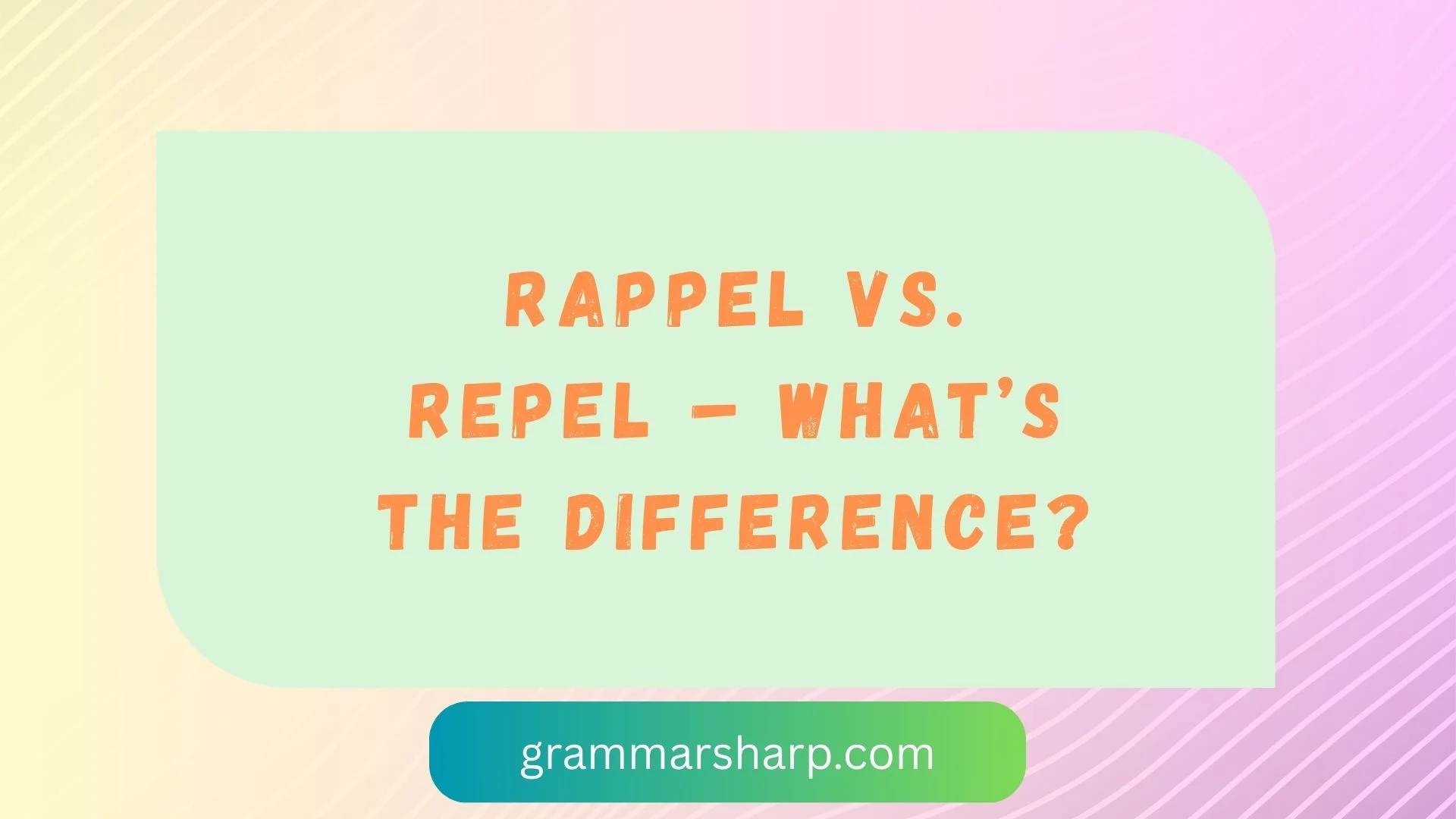English is full of tricky word pairs that can make even confident writers pause. Some words look alike but carry entirely different meanings, while others sound similar enough to cause confusion in everyday use. One such pair that often puzzles learners and even native speakers is “rappel” and “repel.”
At first glance, they seem related. Both words share several letters, both begin with “r,” and both can sound similar when spoken quickly. However, their meanings are worlds apart, and using one in place of the other can drastically change the message you intend to deliver. Imagine telling a group of climbers to “repel down the mountain.” They might think you want them to fight off enemies rather than descend safely with ropes.
So why does this confusion happen, and how can you keep them straight in your mind? That’s exactly what this guide will cover. You’ll learn the definitions, origins, and uses of each word, discover their key differences, and pick up clever memory tricks to keep them separate. By the end, you’ll feel confident using rappel when talking about climbing and repel when discussing defense, resistance, or rejection.
This post also dives deeper with examples, tables, comparisons, and practical tips so you can master these two words and never mix them up again.
What Does Rappel Mean?
Rappel is a verb and sometimes a noun, most often used in the world of climbing. To rappel means to descend a vertical surface, like a cliff or wall, by sliding down a rope while controlling the speed of descent with specialized gear.
- Etymology: The word comes from French “rappeler,” which means “to recall” or “to pull back.” In climbing, it refers to pulling oneself back safely while moving downward.
- Usage: Common in mountaineering, caving, rock climbing, and military training.
Example Sentences with Rappel
- The mountaineers prepared to rappel down the steep cliff.
- Rescue workers used ropes to rappel into the canyon.
- She learned how to rappel safely during her climbing course.
- Firefighters often practice rappelling from tall buildings during training drills.
Fun Fact
The spelling can differ slightly depending on region. In the US, “rappel” is standard, while in the UK you might also see “abseil,” which means the same thing.
What Does Repel Mean?
Repel is a verb that means to drive away, resist, or ward off something or someone. It’s a broader, more versatile word than “rappel” and appears in many contexts, from science to everyday speech.
- Etymology: From Latin “repellere,” which means “to push back.”
- Usage: Describes resisting attacks, fighting off unwanted things, or causing strong dislike.
Example Sentences with Repel
- This spray helps repel mosquitoes in the summer.
- The army managed to repel the invasion.
- Some materials naturally repel water.
- His rude behavior tended to repel people.
Key Insight
Unlike “rappel,” which belongs mostly to outdoor activities, “repel” spans across science, defense, and even human emotions.
Rappel vs. Repel: Key Differences
To clearly separate these two terms, let’s compare them side by side.
| Feature | Rappel | Repel |
| Part of Speech | Verb/Noun | Verb |
| Meaning | To descend a surface with a rope | To drive away, resist, push back |
| Origin | French rappeler (“to pull back”) | Latin repellere (“to push back”) |
| Context | Climbing, military, rescue | Defense, science, daily speech |
| Example | “We will rappel down the cliff.” | “The army repelled the attack.” |
👉 Main Difference: Rappel involves ropes and descending. Repel involves pushing away or resisting.
Common Mistakes Learners Make

Because of their spelling and sound, rappel and repel are easy to confuse. Here are some of the most common mistakes:
- Using “repel” in climbing contexts:
❌ “We’ll repel down the mountain.”
✅ “We’ll rappel down the mountain.” - Using “rappel” in defensive contexts:
❌ “This lotion will rappel mosquitoes.”
✅ “This lotion will repel mosquitoes.” - Pronunciation mix-ups: Many pronounce “rappel” as ra-pell (emphasis on second syllable), while “repel” is ri-pel.
- Assuming they’re interchangeable: They are not—each word belongs to very different situations.
How to Remember the Difference
Memory tricks make it easier to lock the meanings in your head:
- Rappel = Rope (both start with “R”). Picture climbers sliding down a rope.
- Repel = Resist (both start with “Re”). Think of pushing something away.
Another trick is visualization:
- When you hear rappel, imagine someone carefully descending a cliff with ropes.
- When you hear repel, imagine a mosquito bouncing off your arm because of bug spray.
Example Sentences in Real-Life Contexts
Here’s a comparison chart to see both words in action:
| Word | Context | Example Sentence |
| Rappel | Adventure | “The climbers prepared to rappel down the icy slope.” |
| Rappel | Rescue | “Paramedics rappelled from the helicopter to reach the injured hiker.” |
| Repel | Science | “Magnets with the same pole repel each other.” |
| Repel | Everyday Life | “This new fabric is designed to repel water and stains.” |
Rappel in Specialized Fields
Rappelling is not just for adventure seekers. It’s also used in:
- Military training: Soldiers rappel from helicopters or cliffs during operations.
- Firefighting and rescue: Firefighters rappel from tall structures to reach trapped people.
- Caving (spelunking): Explorers rappel to access underground chambers.
Case study: During natural disasters, rescue teams often rely on rappelling to reach survivors in places helicopters can’t land.
Repel in Specialized Fields
The word repel appears across many disciplines:
- Science and Physics:
- “Like charges repel each other.”
- “Magnetic poles repel when they are the same.”
- Everyday Life:
- Bug sprays repel insects.
- Waterproof jackets repel water.
- Emotional/Psychological:
- “Her arrogance repelled potential friends.”
Quick Recap: Rappel vs. Repel
- Rappel: To descend with a rope.
- Repel: To push away or resist.
- Mnemonic: Rappel = rope, Repel = resist.
- Contexts: Adventure vs. defense/science/daily life.
FAQs
Can “rappel” and “repel” be used interchangeably?
No. They carry different meanings and using them incorrectly can cause confusion.
Is “rappel” used outside of climbing?
Yes. It’s used in military and rescue contexts too.
What’s the correct pronunciation of “rappel”
In English: ra-PELL (stress on second syllable).
What’s the noun form of “repel”?
The noun is “repulsion” or “repellent.”
Is it “repellant” or “repellent”?
Both exist, but “repellent” is the more common spelling in modern English.
Conclusion
Words that look or sound similar can cause real confusion, and rappel vs. repel is a prime example. The key is to remember that rappel is all about ropes and climbing while repel is all about pushing back or resisting.
So, the next time you’re talking about outdoor adventures, think ropes and cliffs for “rappel.” When you’re talking about bug sprays, armies, or magnets, think defense and rejection for “repel.”
By locking in these distinctions and using memory tricks, you’ll not only avoid embarrassing mix-ups but also sharpen your vocabulary for clearer, more confident communication.

